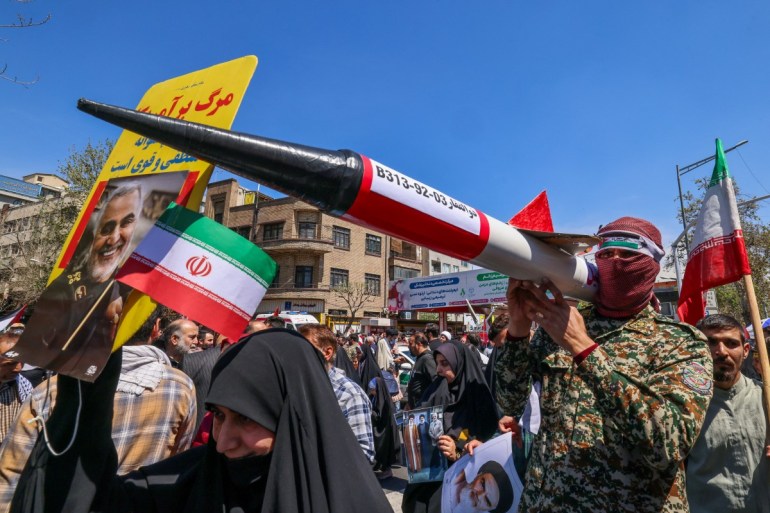[
Israel is reportedly unable to agree on a response to an overnight attack by more than 300 Iranian drones and missiles in response to Israel's own attack on the Iranian Consulate in Damascus on April 1.
According to the Israeli military, 99 percent of the projectiles were intercepted by its jets and those of its allies, including the United States and Jordan. Others were intercepted by Israel's Iron Dome missile defense system, acquired and operated with American help.
While Western diplomats and US President Joe Biden have reportedly told Israeli Prime Minister Benjamin Netanyahu that they would not support further retaliation, some analysts suggest that last night's strikes could prompt the US, Israel's close ally, to carry out a broader May be part of a broader move to pull in regionals. war.
Will you lay the foundation stone on April 1?
In determining how Israel might respond to the overnight attack, analysts have focused on Israel's own attack on the Iranian Consulate on 1 April.
According to at least one Al Jazeera analyst, the attack, which killed two generals and five officers from the Islamic Revolutionary Guard Corps (IRGC), was carried out with little respect for Israel's allies, who were subjected to the attacks. Was informed shortly before.
Hamidreza Azizi, visiting fellow at SWP Berlin, outlined two scenarios, both based on the motivations behind the Israeli attack on the Iranian consulate.
In the first scenario, the Israeli attack occurred with little or no consideration of the consequences. In the second, the attack was a deliberate attempt to draw Iran into a regional war and shift US and Western attention from Israel's war on Gaza to the regional quagmire of Iran.
In both scenarios, US involvement will be critical.
Despite its status as a regional superpower, Israel – deeply strained by the six-month war on Gaza – would stand little chance against Iran's standing army of at least 580,000, with about 200,000 trained troops divided between the army and the IRGC. Will be supplemented by reserve personnel.
“Netanyahu's plan is clear, to divert attention from the war in Gaza and draw the US and other Western allies back into the Middle East,” said Nomi Bar-Yaakov, associate fellow at Chatham House.
“Given the close ties between Israel and the US and Israel's dependence on US aid, Israel should have informed the US that it was planning to attack the Iranian Consulate building where the IRGC is based.
“By not doing so, Israel crossed a red line. There is a need to question Israel's intentions. “An attack on a foreign consulate is an attack on foreign soil under international law, and it is clear that Netanyahu knew he was crossing the line and that Iran would respond with force,” she said.

Over the years, Iran has maintained consistent pressure on Israel through its proxies, not least Hezbollah in Lebanon, which has maintained exchanges of fire with Israel since before October 7.
eyes on the prize
Analysts say Netanyahu's motivations for attempting to draw the US into the war run deeper than Israel's interests alone, and likely speak to concerns close to his heart.
Polls in Israel show that the Prime Minister's popularity is at an extremely low level. Netanyahu built his reputation on the claim that only he and his Likud party stand between Israelis and oblivion, with a surprise attack by Hamas-led fighters on October 7 seriously damaging his position.
HA Hellyer, an official on Middle East security at the Carnegie Endowment, said Israel's choices will be most influenced by how Netanyahu, beleaguered domestically and internationally, will take advantage of Western sympathy for Tel Aviv following Iran's highly telegraphed attack. ” International Peace and Royal United Services Institute.
In the months leading up to October, popular dissatisfaction with Netanyahu was growing as his far-right government attempted to implement changes that would affect Israel's independent judiciary.
In the months following October 7, protests have been growing against his handling of the war on Gaza as he is believed to have no interest in securing the release of remaining captives taken by Israel in the attack.
The protests, in addition to being inflammatory, have evolved into demonstrations against him and his regime.
Even the US appeared to have misplaced its persistence with Netanyahu, as a extremely publicized invitation was issued to Israeli Battle Cupboard member Benny Gantz to come back to Washington, DC for talks.
Netanyahu has labored to regain misplaced floor, utilizing each alternative to place himself on the forefront of a wave of nationalism that has left many in Israel reluctant to finish the warfare.
'A turning level'
Nonetheless, regardless of how Israel portrays itself on this newest battle, it’s America who’s staging the drama.
“What we’ve heard to this point is that the US is just not excited by warfare and we’re signaling that there will probably be a unified diplomatic response to Iran from the West,” Azizi mentioned, whereas additionally calling for restraint. Will go.”
Netanyahu's transfer appears to be in peril because of America's sign.
“We’re at a turning level and the one resolution is diplomatic,” Bar-Yaakov mentioned. “A harsh army response dangers pushing the area additional into unrest.”
Diplomatically, Israel's response to the assault has been much like earlier responses, with its Ambassador to the United Nations calling for a UN Safety Council assembly on the matter, regardless of this newest assault as soon as once more behind Israel. Efforts are being made to unite worldwide opinion. That is Israel's personal response.
Moreover, since Iran is unlikely to undergo any prices for its assault on Israel, it dangers rising divisions in each its personal cupboard and Israeli society if no motion is taken.
“If (Netanyahu) thinks the DC will refuse to assist an assault on Iran, a simultaneous assault on a number of proxies might be another possibility,” Hellyer mentioned.

